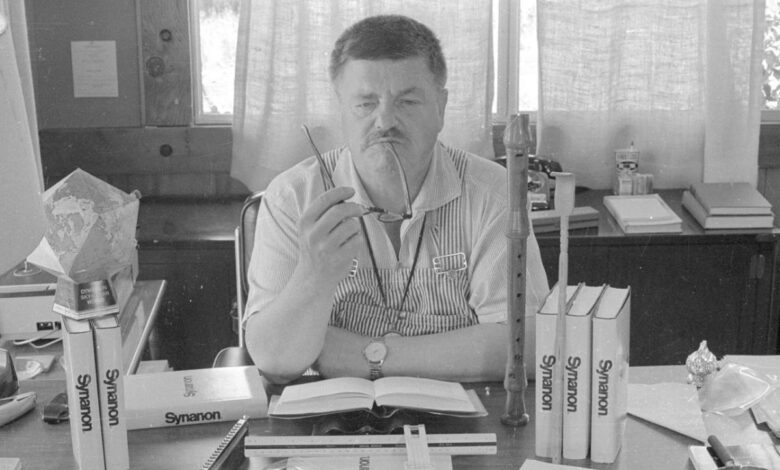Stream It Or Skip It: ‘The Synanon Fix’ on HBO, a docuseries about the drug-treatment community-turned-cult

Four months after Born In Synanon debuted on Paramount+, Synanon is getting the HBO documentary treatment with The Synanon Fix. The four-part docuseries covers a lot of the same ground, but all the interviews are with former members of Synanon, including the daughter of founder Charles “Chuck” Dederich.
Opening Shot: A black-and-white video of a Synanon Game, where people sit in a room and tell each other the brutal the truth about themselves, often at maximum volume.
The Gist: The Synanon Fix is a four-part docuseries, produced by Rory Kennedy and Mark Bailey, that takes a look at the Synanon movement, started by Charles “Chuck” Dederich in 1958 as a way to get people hooked on heroin into an environment where they’re accountable to each other to get and stay clean. During the ’60s, the Santa Monica-based program grew exponentially as word got out on how effective it was to rehabilitate the “dope fiends” that entered the program. But as the program got more fame and raked in more money, Dederich became more erratic, and by the time he was arrested for conspiracy to murder and other charges in 1978, Synanon was close to being a cult.
Kennedy and Bailey talk to a number of former Synanon members, many from the program’s early days when it was purely “dope fiends” helping fellow addicts, welcoming them into a community where that was more open and diverse than any community most of them had seen. Through the sessions that became known as the Synanon Game, the brutal honesty made these people look inward and make changes. At least that was the ideal that Dederich, who got sober via AA but thought a more interactive, discourse-oriented program would work for heroin addicts.
Among the people interviewed is Jady Dederich Montgomery, Chuck Dederich’s daughter and eventual Synanon leader, who is speaking for the first time about her experiences.
Through these interviews and the extensive film footage, archival photos and audio of various Synanon gatherings, we learn about the growth of the organization from its humble beginnings, becoming a pop culture phenomenon by the end of the 1960s, with “squares” and “lifestylers”, none of whom had drug problems, joining the organization because of the community it fostered. It’s these people and not the dope fiends who saw Dederich as some sort of god, which made him become the erratic, power-hungry figure he became in the 1970s.
What Shows Will It Remind You Of? The Synanon Fix covers much of the same ground, albeit with different perspectives, as the Paramount+ docuseries Born In Synanon.
Our Take: If you did watch Born In Synanon, much of what you’re going to see in The Synanon Fix will be familiar. But if you didn’t, you’ll find that Kennedy and Bailey take a pretty straightforward path through the history of Synanon, from its beginnings to when it was effectively disbanded in the 1990s.
There doesn’t need to be a lot of bells and whistles when Synanon’s story is told, thanks to all of the video, audio and photographic evidence that the organization left behind. Instead of filling time with reenactments or snazzy graphics, we have photos and video of the people who are talking to the filmmakers a half-century or more since they joined, documentary interviews with Dederich, and enough Synanon Game footage to make a viewer’s head spin.
What does separate this docuseries from Born In Synanon is that, instead of launching from the perspective of someone born into the organization/cult, we get a lot of perspectives from people who were actually there, especially those who managed to get clean and turn their lives around during the organization’s early days, when it concentrated on rehabilitating addicts.
The one perspective we were interested in seeing was how the “dope fiends” felt when Synanon became less of a treatment method and more of a community and lifestyle. As the “squares” and “lifestylers” became an increasingly larger part of the community, we wanted to know if the addicts felt left behind, and the interviews with some of the addicts that were in the program confirmed that. There definitely seemed to be a pivot within Synanon at some point in the late ’60s, and that pivot is likely what fostered its transformation from a “cure” into a cult.
Another thing that was touched upon but not really explored was that many of the addicts who remained clean while they were a part of the Synanon community relapsed after they left. Dederich was quoted as telling members that they will likely die if they left, but it seemed that no one was questioning the efficacy of the program because of that; because addiction was looked at back then as a moral failing instead of an illness, any program that cleaned people up was looked at with reverence, even if its principles never translated outside the program.
But, like all shows about cult-like organizations, we’re looking for that moment when the greed and power go to Dederich’s head. However, unlike other cult-oriented series, we don’t look at Synanon and scratch our heads about how people could be so in awe of the organization. Yes, the Synanon Game looked like it was more damaging than helpful, especially when it was used with the kids of members who moved into the organization’s community housing. But in the context of the time, the Game was remarkable in its starkness and honesty, and how the people in a Game session would honor the rule to not come to blows, despite some of the vicious, expletive-filled things people would say to and about each other. Then, after that kind of cathartic session, there’d often be a “hoopla”, or dance party, with live music from some of the musicians who were a part of the community. Every time we see that, we’re fascinated.
Sex and Skin: None.
Parting Shot: One former member observes that the “lifestylers” started seeing Dederich as a god, and the “old-timers,” the addicts who were with the program since the beginning and didn’t see Dederich the same way, were being squeezed out.
Sleeper Star: Jady Dederich Montgomery’s firsthand accounts of growing up in Synanon and eventually becoming its leader are invaluable.
Most Pilot-y Line: Much of the Synanon Game footage is cringe-inducing, but as we said, you have to think of it within the context of the time. However, subjecting kids to the Synanon Game was as wrong then as it is now. Most of them just couldn’t handle the insults, the cursing, and the attacks.
Our Call: STREAM IT. While we didn’t see a lot in The Synanon Fix that we didn’t see in previous Synanon-centric docuseries, the whole phenomenon of Synanon is just so fascinating to watch that we didn’t mind exploring it again, with some new voices to describe their experiences.
Joel Keller (@joelkeller) writes about food, entertainment, parenting and tech, but he doesn’t kid himself: he’s a TV junkie. His writing has appeared in the New York Times, Slate, Salon, RollingStone.com, VanityFair.com, Fast Company and elsewhere.
Get Best News and Web Services here







